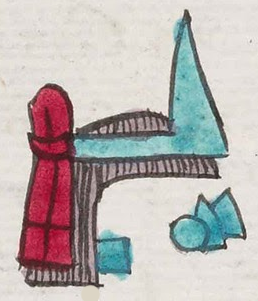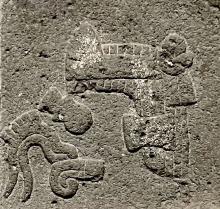Motecuhzoma (Mdz15v)
This compound glyph for the personal name Motecuhzoma (here apparently Motecuhzoma Xocoyotzin, the Younger) features a diadem in profile, facing toward the viewer's right. This turquoise-colored diadem (the xiuhhuitzolli) is a glyph for lord (tecuhtli). The hair, tzontli, which appears under the diadem, may provide a phonetic complement for zoma (to frown in anger), the final part of the name. The small turquoise-colored elements--one floating in the air and one attached to the hair--have yet to be analyzed, but one may be a lip plug and the other an ear plug.
Stephanie Wood
The museum comparison, below, also includes the diadem and hair--along with perhaps the lip plug and ear plug. Speech scrolls on this stone carving may point to the fact that Motecuhzoma was a huei tlatoani (great ruler, or tlahtoani, with the glottal stop), given that speech scrolls can stand for the verb tlatoa/tlahtoa, to speak.
Stephanie Wood
motecçuma
Motecuhzoma
Stephanie Wood
c. 1541, but by 1553 at the latest
The four elements counted here include the diadem, hair, lip plug, and ear plug, which all seem to be diagnostic for Motecuhzoma.
emperors, empires, rulers, gobernantes, emperadores, imperios, diademas, Montezuma, Moteuczoma, labrets, enchufes, tapones, labios, bezotes, adornos labiales, jewelry, jollas, lip plugs, lip-plugs, teuctli, nombres de hombres, personas famosas
Motecuhzoma. A bas relief stone carving on the underside of the lid of the so-called "Caja de Moctezuma Xocoyotzin," Museo Nacional de Antropología e Historia, Salón Mexica. The Museo describes the headdress as a xiuhitzolli [xiuhhuitzolli], which is the turquoise diadem. The museum signage also refers to it as the "imperial headdress." Photograph by Robert Haskett, 14 February 2023.

tecuh(tli), lord, https://nahuatl.wired-humanities.org/content/tecuhtli
zoma, to frown in anger, https://nahuatl.wired-humanities.org/content/zoma
tzon(tli), hair, https://nahuatl.wired-humanities.org/content/tzontli
tlatoa, or tlahtoa with the glottal stop, to speak, https://nahuatl.wired-humanities.org/content/tlatoa
Codex Mendoza, folio 15 verso, https://digital.bodleian.ox.ac.uk/objects/2fea788e-2aa2-4f08-b6d9-648c00..., image 41 of 188.
Original manuscript is held by the Bodleian Libraries, University of Oxford, MS. Arch. Selden. A. 1; used here with the UK Creative Commons, “Attribution-NonCommercial-ShareAlike 3.0 License” (CC-BY-NC-SA 3.0)








